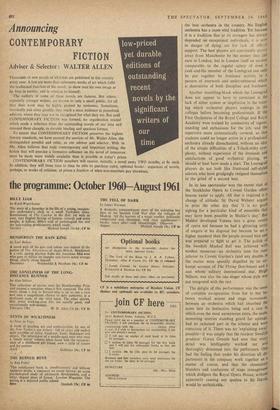Mu s ic
Foreign Lessons
By DAVID CAIRNS IT is tempting to use the visit of foreign musicians to England as a stick with which to beat our own. It is a temptation that should not be re- sisted. This has nothing to do with any sado- masochistic pleasures that may attend the pro- cess, nor do the com- parisons have to be made in terms of rival egos and national prestige. There is so much to be learned to our profit. No doubt, when the memory of the marvellous Leningrad concerts begins to fade, we shall be told that they were not really so remarkable or that all orchestras play twice as well abroad—if we could hear a routine end-of-season programme in Leningrad it would be a very different story.
Provincialism is always with us, glib to ex- plain away any discrepancies between English and the best continental standards; over the years our musical system has grown layers of pro- tective fat with which to cushion the painful impact of foreign ideas. But by crossly pointing out that the Leningrad players earn far more than ours and have more rehearsals for each concert the apologist has already said enough. The underlying difference between the Lenin- grad Orchestra and the most prestigious of ours is a difference of tradition—tradition, that is, expressed not merely in good will but in hard cash and a defined status in society. In our sheep-like lip service to 'freedom' we dutifully bleat that massive State support of the means of music must lead to massive State interference with the ends. But the Zhdanovism which dis- torted Soviet music under Stalin (and which muzzled for a time the sombre, intensely per- sonal broodings of Shostakovitch's Eighth Sym- phony, now rehabilitated and performed here last Friday with enormous effect) is not the inevitable consequence of a large bureaucrati- cally administered subsidy. If we find the Leningrad example unacceptable, the Berlin Philharmonic will do as well.
The precariousness of a system of haphazard patronage can be illustrated with melancholy aptness from the fortunes of the Halle, described in detail in Michael Kennedy's history published last week by Manchester University Press (35s.). For several periods in its life the Halle has been
the best orchestra in the country. No English orchestra has a more vital tradition. Yet because it is a tradition that at its strongest has always depended on exceptional individuals, it is now in danger of dying out for lack of
support. The best players are continually drawn away from Manchester by the, money they can earn in London; but in London itself an income comparable to the regular salary of even a rank-and-file member of the Leningrad can only be put together by freelance activity in a pattern of overwork and under-rehearsal which is destructive of both discipline and freshness.
Another stumbling-block which the Leningrad does not appear to have to surmount is the lack of either system or inspiration in the train' ing which orchestral players undergo in the colleges before becoming professionals. If the First Orchestras of the Royal College and Royal Academy were trained by conductors of vigour, standing and enthusiasm for the job, and the repertoire more systematically covered, so that students could no longer arrive in a professional orchestra already disenchanted, without an idea of the simple difficulties of a Tchaikovsky syny phony, without experience of the demands and
satisfactions of good orchestral playing, We
should at least have made a start. The Leningrad players do not look like frustrated self-styled
soloists who have grudgingly resigned themselves
to the grind of a second best.
In its less spectacular way the recent visit of the Stockholm Opera to Covent Garden offers lessons easier to apply. All that is required is a change of attitude; Sir David Webster argued in print the other day that 'it is no good sighing for a particular kind of ensemble that may have been possible in Mahler's day.' But Mahler developed Vienna into a great centre of opera not because he had a glittering arraY of singers at his disposal but because he set 3 higher standard than the people around him and was prepared to fight to get it. The polish of the Swedish Masked Ball was achieved With modest resources—an orchestra man for man inferior to Covent Garden's (and any doubts in the matter were speedily dispelled by its un- kempt account of The Flying Dutchman) and 3 cast whose solitary international star, Birgit Nillson, was also the one singer whose style was not integrated with the rest.
The delight of this performance was the sense of complete co-operation from bar to bar be- tween musical accent and stage movement, between an orchestra which had absorbed the score into its instinctive being and a cast in which even the most anonymous extra, the mute, unmoving sentries standing guard far upstage, had an ordained part in the scheme and were conscious of it. There was no 'explaining awaY possible—it was simply that the resident Swedish producer Goran Gentele had seen that every detail was intelligently worked out and thoroughly drummed into the performers. One had the feeling that under his direction all dr partments in the company work together as matter of course, and that the elementary blunders and confusions of stage management
which disfigure the Royal Opera House, without apparently causing any qualms to Sir David, would be unthinkable.











































 Previous page
Previous page